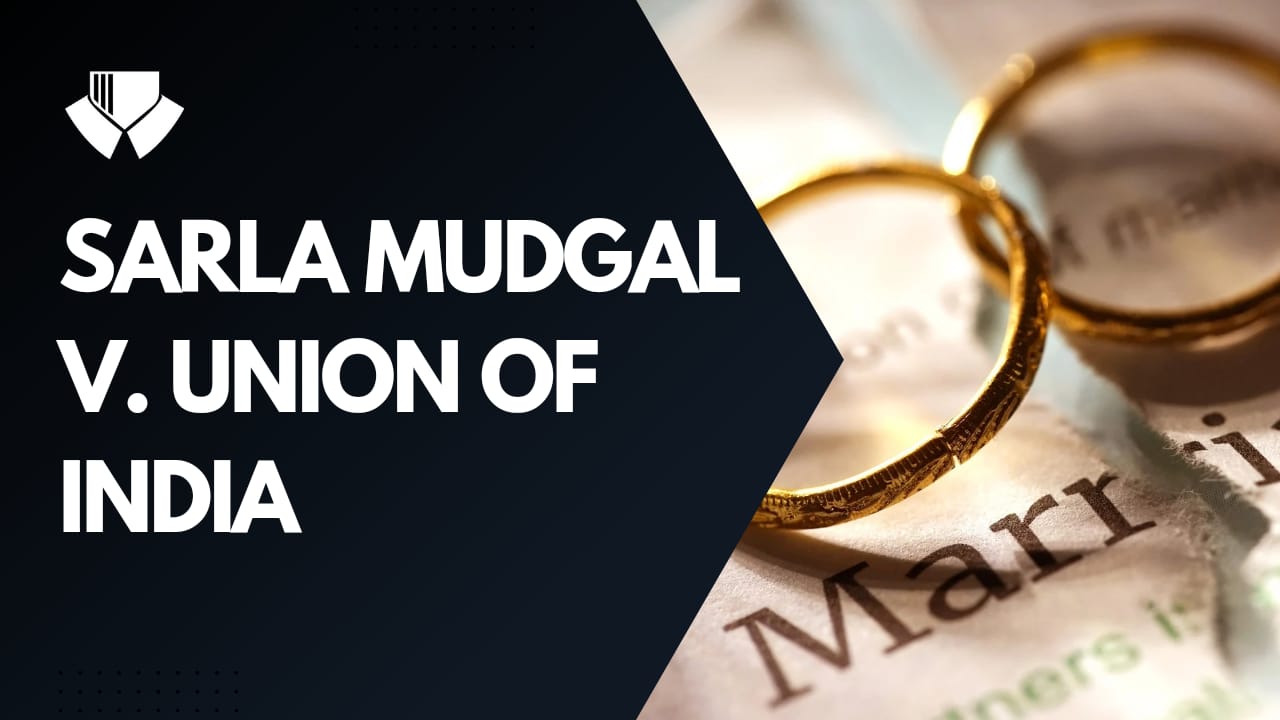This case analysis is written by Sagili Bhavana Sree, a 2nd year Law Student at Damodaram Sanjivayya National University.
Citation- (1995) 3 SCC 635
BENCH: Justice KULDIP SINGH , Justice SAHAI, R.M.
Date- 10 May 1995
FACTS
Instances of religious conversion for personal gain, exploiting differing religious laws, are not unconventional. Sarla Mudgal v. Union of India exemplifies such cases, where a spouse embraced Islam to marry another woman while maintaining their existing Hindu marriage without dissolution. This strategic conversion highlights the attempt to capitalize on favorable legal provisions in different religions. Multiple petitions were presented before the Supreme Court of India under Article 32 of the Indian Constitution. One involved Sarla Mudgal, president of the NGO Kalyani, aiding distressed women. Meena Mathur discovered her husband, Jitender Mathur, had married Sunita Narula (Fathima) after converting to Islam to evade the Indian Penal Code’s Section 494. Another petition featured Sunita Narula, asserting Jitender Mathur converted back to Hinduism under Meena’s influence, abandoning her as an unprotected Muslim due to personal law complexities.
The third case involved Geeta Rani, who alleges spousal abuse by Pradeep Kumar. He embraced Islam after deserting Geeta and marrying Deepa. Geeta accused him of exploiting religious conversion to subvert IPC Section 494. These cases underscore the issue of religious conversion being utilized to evade legal provisions and responsibilities, particularly relating to multiple marriages. The Supreme Court’s consideration is vital in clarifying the legal stance on such conversions and upholding the rights and protections of all parties involved, irrespective of their religious affiliations.
ISSUES
- Can a Hindu man solemnize his second marriage by converting himself to Islam without dissolving his first marriage?
- Is such a marriage a legal marriage without dissolving the first marriage under the law?
- Whether the apostate husband would be liable under section 494 of the Indian Penal Code, 1860?
CONTENTIONS
PETITIONER
The marriage between the petitioner and respondent was solemnized following specific personal laws. The petitioners argue that their spouses’ subsequent marriages infringe upon the rights protected by these personal laws. The respondents are contracting new marriages while keeping their first marriages intact, thereby encroaching upon the rights of reluctant spouses who are averse to changing their faith.
Instances exist where coercion compels spouses to undergo religious conversion, which directly violates the fundamental freedom of religion safeguarded by Article 25 of the Indian Constitution. The aggrieved parties seek recourse from the guardian of the constitution, appealing for justice to safeguard their rights.
RESPONDENTS
The respondents maintain that a specific provision within one personal law should universally govern all personal laws. To elucidate, they contend that the regulations outlined in Muslim personal law should extend to Hindu personal law and other religiously grounded personal laws. Citing Muslim personal law, the respondents assert that a scenario where one spouse does not share the Islamic faith results in the marriage’s dissolution.
According to the respondent’s argument, if a spouse transitions from Hinduism to Islam, the other partner is obliged to convert to Islam to uphold the marriage. Failure to adopt this religious conversion, as per their stance, grants the apostate husband the right to marry another woman without nullifying his initial marriage. In such a situation, the husband would also evade legal repercussions under Section 494 of the Indian Penal Code, 1860, about bigamy.
JUDGMENT
The Supreme Court of India, often referred to as the guardian of the Indian Constitution, has consistently upheld the Constitution’s integrity and sovereignty since the nation’s independence. Throughout its history, the court has remained steadfast in its mission to safeguard these principles.
In the context of traditional Hindu marriage law, the doctrine of the dissolubility of marriage holds no sway over religious conversions. Converting one’s religion and subsequently marrying another woman does not lead to the annulment of a prior marriage that was solemnized under Hindu marriage law.
Marriage stands as a cornerstone of civilized society, imposing various obligations and responsibilities on the parties involved. While Hindu law enforces monogamy, Muslim law, guided by the Shariat law of 1937, permits a Muslim male in India to have up to four wives. This dichotomy leads to scenarios where a Hindu man adopts Islam to enter into a second marriage without dissolving his initial marriage. This maneuver allows him to evade the legal responsibilities imposed by Section 494 of the Indian Penal Code, 1860.
Marriages can be dissolved either through the provisions of the Divorce Act or due to the demise of one of the spouses. Within the context of the Hindu Marriage Act, dissolution is only feasible based on the grounds delineated in Section 13 of the Hindu Marriage Act, 1954. Notably, a marriage remains intact upon the conversion of a spouse to Islam, rendering their subsequent marriage, as per Muslim law, an infringement upon the foundational act, thus effectively maintaining their original marital status.
Consequently, this renders a second marriage legally invalid and contrary to the principles of natural justice. Permitting the second marriage of an apostate husband without terminating the first after their conversion to Islam appears arbitrary and unjust. Such a scenario offers a conspicuous means to evade the stipulations outlined in Section 494 of the Indian Penal Code, underscoring its inherent circumvention.
CONCLUSION
The Supreme Court of India places significant emphasis on the implementation of a Uniform Civil Code (UCC) in India. This code would comprehensively regulate various aspects including marriage, divorce, adoption, inheritance, child custody, and other matters related to matrimonial disputes. The code would be uniformly applicable to all religious communities. The primary goal of the Uniform Civil Code is to ensure consistent governance across all religious groups in India.
The Sarla Mudgal judgement stands as a significant precedent endorsing the Uniform Civil Code. The judgement highlighted instances where conflicting personal laws from different religions have led to legal dilemmas. Notably, the judgement deemed the second marriage of a Hindu husband void under Section 494 of the Indian Penal Code. Justice Kuldip Singh, delivering the verdict, noted, “When over 80% of citizens are already governed by codified personal laws, there’s no valid reason to delay the introduction of a ‘uniform civil code’ for all Indian citizens.”
The judgement further urged the government to reconsider Article 44 of the Indian Constitution, which advocates for a Uniform Civil Code, thus underscoring the need for a unified legal framework for all citizens.


